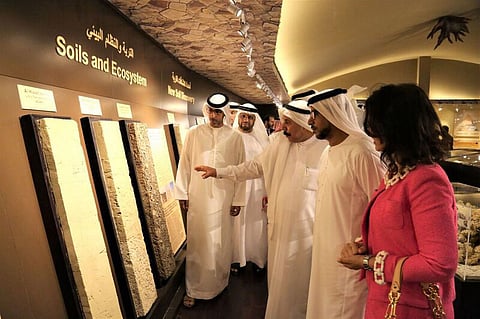Emirates Soil Museum opens
Museum features soil collection from all seven emirates

Dubai: A new museum fully dedicated to the study, presentation and preservation of the UAE’s soil and its components has opened to the public.
The International Centre for Biosaline Agriculture (ICBA) and the Abu Dhabi Fund for Development (ADFD) inaugurated the Emirates Soil Museum on Thursday with an aim to serve as an information hub and help build awareness on issues such as soil degradation and loss.
“This is a one-stop shop for everybody who wants to know about soil, soil history, and also [the types of] soil in the UAE. Most people think that the UAE is a big desert, but it’s not. There are different components in different parts of the UAE,” Dr Ismahane Elouafi, director-general of ICBA, told Gulf News.
“Soil is very diverse. They host millions and billions of microorganisms that live in the soil. We have not completely understood all that population yet. So this museum is the beginning of understanding the different types of soil, the different microflora that are in it and to bring awareness of their importance.”
Soil and the ecosystems services it provides, including food, fuel, fibre and feed production, are critical for life on earth. Hence the need to encourage people to preserve soil for generations to come, which is the museum’s major role.
“The museum will help raise awareness of soil research and preservation, demonstrate the importance of soil in urban planning and its underlining measure to manage and secure food,” Mohammad Saif Al Suwaidi, director-general of ADFD, said.
More than 95 per cent of global food production uses soil as a base. By 2050, agricultural production must increase by 60 per cent to meet food demand, putting pressure on land resources. Threats to soil have a direct effect on food production and globally, 33 per cent of the land is in a state of degradation.
Below five per cent of the land in the UAE is arable. But the ICBA has successfully conducted various research to improve agricultural productivity and sustainability in marginal and saline environments like those in the UAE.
At the museum, vertical slices of soil or soil monoliths taken from across the country are displayed to show the natural state of soil. Visitors will get a chance to see how simple soil changes, such as porosity, soil structure, types of minerals present, among others.
The museum also contains samples of the Anhydrite soil found on the coastal lands of the UAE. This world-first discovery helped the UAE gain international recognition from the US Department of Agriculture and it was officially added into the US Keys to Soil Taxonomy. Anhydrite can sometimes be used for soil treatment, for substitutes for gypsum, and some industrial uses.
BOX: FACT FILE
What: Emirates Soil Museum
Where: International Centre for Biosaline Agriculture compound on Dubai-Al Ain Road
Timings: Weekdays, 8.30am to 4.30pm
*Special tours are arranged on request for groups of schoolchildren and students
Sign up for the Daily Briefing
Get the latest news and updates straight to your inbox



